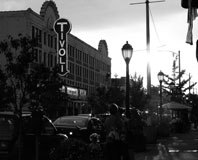
Night Migration
William Holden in Stalag 17
Elvis and Priscilla, 1968
Trimming knives lie in stacked X’s in the last yard of the day.
“Stairway to Heaven” pours from a boom box like cooler air.
Each staircase of bundled fronds is like the one Robert Plant
describes before the supervisor twists a volume knob as if he’s
heard it all before—that dream of redemption/reward/afterlife
re-apportioned like the idea that any of us ever buys our way
into or through a world other than this one. The light is going.
An idling Volvo truck sighs arpeggios of exhaust as workers
shake off leaf-dust. One man plants himself by the boom box
to crank up the guitar solo as if some music softens hard truths.
Every evening along US 1 in South Florida, and in all seasons,
trucks carry them, engines singing of brown-skinned realities
and laboring in the groves of orange and lemon and grapefruit
or landscaping gated communities with names like Medallion,
where latter-day pirates cash in a lifetime of loot and plunder
for 11,000 square feet of X-marks-the-spot on an acre and a half.
Those in the trucks would be the first to tell you life isn’t fair,
talking to each other, themselves, as rips of sunset-pink or -red
appear in the vault of sky over Young & Prill Funeral Home.
What do I care if they’re weary and climb down from a tailgate
as if a day had asked everything of them and they’d answered?
What do I know of returning to a wreck of a gold Toyota Corolla
in the dim parking lot of a Publix, having to pray for the miracle
of the internal combustion engine to again carry you to a room
with thin, pictureless walls and a wash basin? If there is a soul,
it’s in men like these. Which is why some doubt—that oldest
of parlor games—the spirit’s existence, given a tendency to stare
into the distance, to look off into whatever Florida coastal town
“rips the bones from your back,” as Bruce Springsteen sang once,
then keep looking for that heaven the first light of stars is selling.
The planking laid down for the camp commandant goes
only so far, and his polished field-marshal black boots
halt before a sea of mud, the corpses of two Americans.
He drones on, the commandant, about Aryan supremacy.
There’s one in any gathering of Americans who’ll toss
the stone that splashes mud-glops onto those shiny boots.
Oh the heart of that man. The miracle-gift for mischief.
Much like J.J. Sefton/Bill Holden who has bet the farm
on the Inevitable since there’s a sucker born every minute
and winds up breakfasting on an egg he traded the Nazis
45 cigarettes for. The cigarettes, he won betting against
the two dead under the tarp. His war is private, what do
you expect? He’d trade Mom and the last bite of apple pie.
Of course the Wrong Guy gets an ass-whipping. Of course
the guy with the footlocker brimming contraband is suspect.
Even the trickle of electric light is an American invention
arrived at by trial and error under aggravating hours of
gaslight. Of course the real stoolie is the first to speak up.
And to strike a blow when the beating comes. He knows
but isn’t saying what’s true, which is that no one likes
a winner. Winners know the signal, the looped-once
light-cord, and how the hollowed-out Black Queen
holds all the intelligence the Nazis need. Leave it
to the Americans to know to use a one-legged man
as diversion: lots of smoke from a smudge pot jerry-
rigged to be lit and dropped from his stump-sleeve.
In the red delight of a January dawn she scissors away
at his mutton-chop sideburns. Either they’re up early
or haven’t slept, this during the collapse of his career,
before the ’68 Comeback, their affection for one another
yet swallowing the world like a leviathan ingesting krill,
the ellipsis of pregnancy an enormity of first-light hope
feeding a rock ‘n roll fantasy. Elvis croons to her softly,
their only guide a shared look of love, the place where
the merlin spell of togetherness and intimacy redeems
like his recurring dream of being stranded without a radio
in a white ’63 T-Bird convertible with circular taillights
and a little effigy of the planet, a globe, on the console
between them. She moves the black Ace comb, snipping.
And stops now and again to touch the face of her beloved.
There’s an air of iciness, even with Graceland the winter
glow of fireplaces, the Memphis Mafia asleep upstairs,
the new-song swelling curve of her belly testing gravity.
Shame on the Beatles for stealing his American thunder.
Shame on evangelistic Colonel Parker and Hollywood.
Then shame on the King for breaking off her sweet kiss,
sweeping aside the barber-drape to answer a telephone.
Roy Bentley has won a Creative Writing Fellowship in Poetry from the National Endowment for the Arts, as well as individual artist fellowships from the Florida Division of Cultural Affairs and the Ohio Arts Council. Thus far, four full-length books by Bentley have appeared: Boy in a Boat (Univ of Alabama), Any One Man (Bottom Dog), The Trouble with a Short Horse in Montana (White Pine), and Starlight Taxi (Lynx House Press)—as well as a chapbook called “Saturday Afternoon at the Midland Theatre in Newark, Ohio” in Mudlark: An Electronic Journal of Poetry & Poetics.

